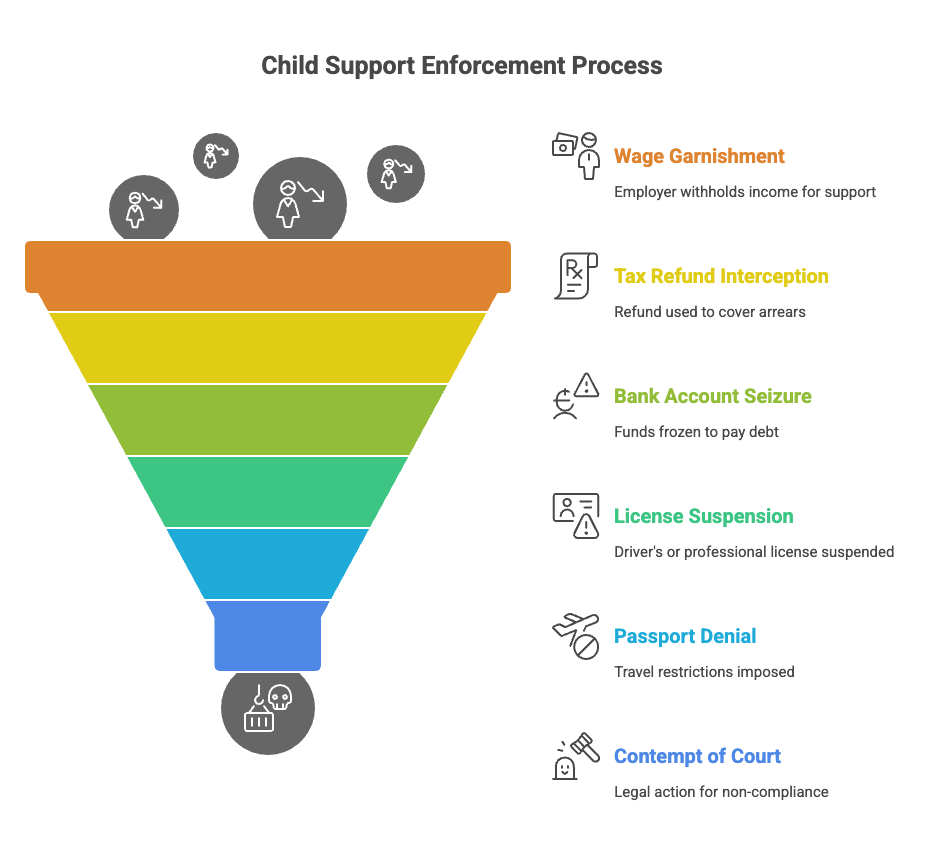- Why Enforcement Might Be Necessary
- What Exactly Are Child Support Arrears?
- The Role of Colorado's Child Support Enforcement (CSE) Agency
- How Does Enforcement Work in Colorado? The Main Tools
- Let's Take a Closer Look at License Suspensions
- So, Which Route Should You Take: Court or Administrative Enforcement?
- Can Problems Be Prevented with Modifications?
- Why Experience Counts: How Jones Law Firm Gets Results
- Moving Forward: Supporting Your Child and Avoiding Future Issues
- Final Thoughts

Nobody really wants to talk about unpaid child support. But here’s the thing: it happens more often than we’d like, and when it does, it can create a big financial strain on the parent who’s relying on that money to help take care of their child. I get it; it’s frustrating and stressful, and sometimes it feels like you’re stuck in limbo, not knowing what to do next.
That’s why understanding child support enforcement in Colorado matters. While child support orders are legally binding, unfortunately, not every parent pays on time, or at all. When that happens, the state doesn’t just shrug its shoulders. It has a whole toolbox of ways to make sure that the payments get made because the goal here is simple: making sure kids get the financial support they need, not just punishing anyone.
Why Enforcement Might Be Necessary
Imagine this scenario: A Colorado court orders a non-custodial parent to pay $500 a month in child support. At first, payments are steady. But after a while, maybe the paying parent loses their job or just decides to stop paying. Over several months, those missed payments add up, and now there are thousands owed. At some point, the custodial parent might need to take action to get what was ordered.
That’s where child support enforcement steps in. Colorado has serious tools, wage garnishment, tax refund interception, even license suspensions, to help custodial parents collect what’s owed. And depending on your situation, you can work through the state’s Child Support Enforcement (CSE) agency, or bring in your own attorney to push things along faster.
What Exactly Are Child Support Arrears?
Simply put, arrears are unpaid child support that’s piled up over time. Think of it as a tab the parent who’s supposed to pay has racked up, and the bill doesn’t just disappear. Colorado’s courts look at these orders as firm commitments, so the debt you owe stays on the books (and sometimes grows, with interest).
Now, why do parents fall behind?
- Sometimes it’s genuine hardship, like losing a job or unexpected bills that make it impossible to keep up.
- Other times, it’s willful, maybe they’re choosing not to pay, either out of spite, neglect, or trying to dodge responsibility.
Understanding the “why” matters. Courts are usually willing to work with parents going through tough times but are pretty tough on those purposely avoiding payments.
And here’s an important tip: if you’re the parent supposed to be paying, don’t just stop. Talk to a lawyer or the court about modifying your support obligation. That’s way better than letting arrears pile up and trigger enforcement actions.
The Role of Colorado’s Child Support Enforcement (CSE) Agency
If you’ve heard of “Child Support Services” or the “CSE Unit,” that’s the state agency designed to help make sure payments happen. If you open a case with them, they’ll help track down the paying parent, find their job, and automate enforcement like wage garnishments. Many parents find this a really helpful option because it doesn’t cost much and takes some of the hassle off your plate.
But full disclosure: CSE can get backed up with cases, so sometimes things move slow. That’s why some parents decide to hire a private attorney to work alongside the agency, especially to bring faster court enforcement when necessary.
Here are some key powers of CSE:
- Locating absent parents
- Establishing paternity if needed
- Garnishing wages automatically
- Seizing tax refunds
- Reporting unpaid support to credit bureaus
Basically, they’ve got a lot of arrows in their quiver.
How Does Enforcement Work in Colorado? The Main Tools
If you’re wondering what enforcement looks like in real life, here’s a quick breakdown:
- Wage Garnishment: Probably the most common and straightforward method. The state can require an employer to withhold up to 50-60% of a parent’s disposable income for support payments, depending on if the parent has other dependents. Fun fact, there’s even an extra 5% garnishment allowed if someone has been behind for more than 12 weeks. This keeps payments steady and predictable.
- Intercepting Tax Refunds: Got an IRS or state tax refund coming? If there are unpaid child support arrears, a chunk (or all) of that refund can be sent directly to the custodial parent to cover what’s owed. It’s a pretty effective way to catch up on back payments.
- Bank Account Seizure & Liens: Colorado can freeze funds in the non-paying parent’s bank accounts and can even place liens on their property, think houses or cars, so they can’t sell or refinance without paying off child support debt.
- License Suspensions: This might sound harsh, but it works. When a parent is at least six months behind and paying less than half their monthly amount, Colorado can suspend their driver’s license or even professional and recreational licenses. Losing the ability to drive or work can be a strong motivator to get caught up.
- Passport Denial: On a federal level, if child support arrears exceed $2,500, the parent can be denied a passport. So no exotic international vacations until the debt is cleared.
- Contempt of Court: When things get serious and a parent refuses to comply despite having the means, courts can hold them in contempt, which might result in fines or even jail time. It’s a last resort, but it sends a clear message that child support orders are not optional.
- Federal Prosecution: This is rare, but for the truly egregious cases like crossing state lines to avoid support or massive unpaid amounts, federal laws kick in. It can lead to criminal charges, reflecting society’s stance on the importance of child support.

Let’s Take a Closer Look at License Suspensions
Why do I bring up license suspensions in particular? Because it’s a very real and relatable consequence. Imagine not being able to drive to work or school because you’re behind on child support payments. It’s happened before, and it forces the issue front and center.
Colorado law spells it out, licenses can be suspended when a parent is 6 months behind and not paying at least half of what’s owed. This isn’t just driving licenses; it includes professional or recreational licenses, from contractors to hunting permits.
Usually, before suspension, the parent gets warnings and chances to set up payment plans. That said, for parents truly struggling, this is also a reminder to seek support modifications before things get this far.
So, Which Route Should You Take: Court or Administrative Enforcement?
Good question. It breaks down like this:
- Administrative Enforcement is the default route when you open a case with Child Support Services. They handle enforcement automatically, wage garnishments, tax intercepts, that sort of thing. It’s usually easier and less expensive but can feel slow or hands-off.
- Court Enforcement means you involve an attorney who can file motions like contempt or enforcement motions. This path can be quicker and more direct because you’re bringing the case right to a judge who can issue immediate orders or hold hearings that require the non-paying parent to answer.
Many parents do both: start with the agency but also hire an attorney to stay proactive, especially if payments aren’t coming through as they should.
Can Problems Be Prevented with Modifications?
Absolutely. Sometimes the best enforcement action is none at all. If the paying parent’s financial situation changes, Colorado law allows them to petition the court for a modification, basically adjusting the amount they owe to something manageable.
Jones Law Firm often advises clients to pursue modifications before falling behind. Doing so helps avoid harsh enforcement like license suspensions or contempt hearings. Modifications aren’t easy, but they’re often the most practical and humane solution when things get tough.

Why Experience Counts: How Jones Law Firm Gets Results
Navigating child support enforcement can be overwhelming. That’s why having an experienced legal team by your side really matters. With over 20 years of experience and thousands of cases under their belt, Jones Law Firm knows how to find the right enforcement strategy for your unique case.
“Our legal team has extensive experience with court order enforcement and modifications, and we can help you aggressively pursue a favorable outcome in your case,” says a spokesperson for Jones Law Firm.
They understand not just the tools available, but how to use them quickly and effectively, whether it’s coordinating with the state agency or taking direct court action.
Plus, a good lawyer helps you avoid pitfalls, like trying to enforce payments yourself in ways that could cause trouble (no tempting to withhold visitation, for example!).
Moving Forward: Supporting Your Child and Avoiding Future Issues
Once enforcement brings those payments back on track, it’s worth thinking ahead:
- Set up automatic payments or wage assignments. This removes the guesswork and helps prevent missed payments.
- Keep communication open when possible. If finances get tight, talking honestly can help arrange temporary solutions or start modification proceedings.
Remember, enforcement isn’t about “winning” or “losing” against the other parent. It’s about doing right by your child, making sure they have what they need to thrive.
Final Thoughts
Child support enforcement in Colorado might seem daunting, but there’s real hope and real help out there. Whether you’re the custodial parent chasing down past-due payments or the payer feeling overwhelmed and unsure about what to do, knowing your options is the first step.
The state offers strong mechanisms to ensure families get the support they deserve, and experienced attorneys like those at Jones Law Firm can guide you through the process and make sure it’s handled effectively and fairly.
If you’re facing unpaid child support or want to understand more about Colorado’s enforcement options, don’t hesitate to reach out for help sooner rather than later. Remember, the sooner you act, the faster you can protect your child’s financial future, and that peace of mind is priceless.
At Jones Law Firm, we’re not just legal experts, we’re people who understand how important every dollar of child support is for a family’s well-being. With more than two decades helping Colorado families and a deep understanding of child support enforcement and modifications, our team is ready to stand with you. We’ll help you explore all the options, act quickly, and find the solution that works best for your situation.
Ready to take the next step? Visit DenverDivorceAttorneys.com or call us at (303) 951-4757 for a free, confidential consultation. Let’s work together to make sure your child gets the support they deserve.